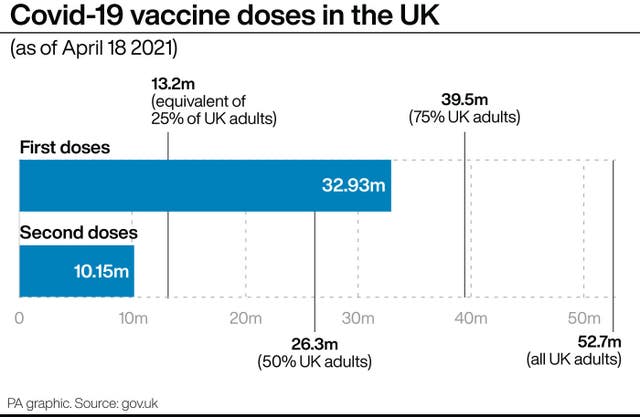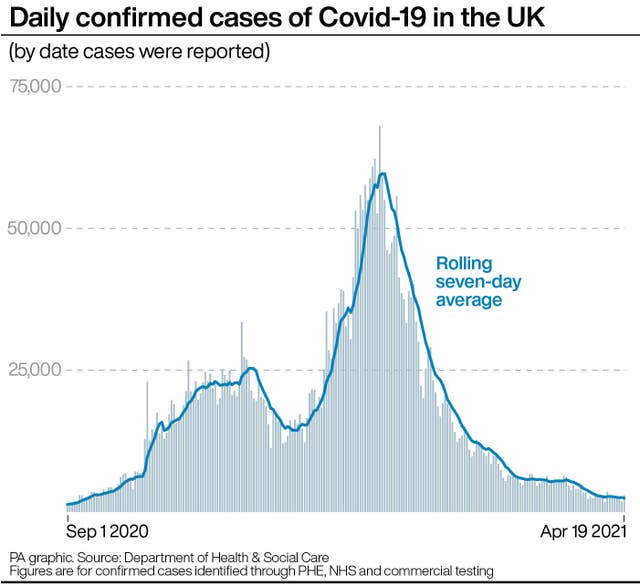India added to red list as concerns mount over coronavirus variants
Health Secretary Matt Hancock said 103 cases of the Indian variant had been identified in the UK.

India has been added to the coronavirus “red list” in response to mounting concern about the number of cases there and the emergence of a variant.
The move, announced just hours after Boris Johnson was forced to cancel a trip to the country, comes into force at 4am on Friday, meaning Britons returning after that point will be forced to quarantine in a hotel for 10 days.
Anyone who is not a UK or Irish resident or a British citizen will be banned from entering the country if they have been in India in the previous 10 days.
Health Secretary Matt Hancock said so far 103 cases of the Indian variant had been identified in the UK.
The decision on India restrictions was taken “on a four-nation basis”, the Scottish Government said.
Concern about variants of the disease – and whether existing vaccines will prove effective – has led to the Government ramping up plans for a campaign of booster shots later this year.
Mr Hancock told MPs: “We’ve recently seen a new variant first identified in India. We’ve now detected 103 cases of this variant, of which again the vast majority have links to international travel and have been picked up by our testing at the border.”
Mr Hancock said the samples have been analysed to see if the new variant has any “concerning characteristics” such as greater transmissibility or resistance to treatments and vaccines.
He added: “After studying the data, and on a precautionary basis, we’ve made the difficult but vital decision to add India to the red list.”
The Prime Minister had been due to travel to India on Sunday on a trip which had already been dramatically scaled back due to the pandemic.

Mr Johnson and his Indian counterpart Narendra Modi agreed the cancellation of the trip as New Delhi entered a week-long lockdown to tackle a surge in cases and prevent a collapse of the capital’s health system, as India reported 273,810 new infections – the highest daily rise since the pandemic began.
The Prime Minister said: “I do think it’s only sensible to postpone, given what’s happened in India, the shape of the pandemic there.”
The Department for Transport said the situation in India “has deteriorated with an extremely rapid rise in cases detected throughout April, which is accelerating”.
It added that despite current travel measures, “there is a high volume of travel between India and the UK”.
The Health Secretary highlighted the success of the vaccine rollout – with 10 million people now having received two doses – and falling hospital admissions and deaths.
But he told the Commons: “The biggest risk to our progress here in the UK is a new variant that the vaccine does not work as well.”
In the same way that updated vaccines were deployed to tackle flu mutations, Mr Hancock said the Government was “ramping up plans for a booster shot to make sure our vaccines stay ahead of the virus”.

“We’ve already procured enough vaccine doses to begin the booster shots later this year,” he said.
Work was being carried out to assess which vaccines will be effective in targeting “variants of concern”, such as the one first found in South Africa.
Mr Hancock said 557 cases of the variant had been detected since December, with a “cluster” of cases in south London and isolated cases in Barnet, Birmingham and Sandwell over the last week.
While around two-thirds were related to international travel, there has been a “small amount” of community transmission, Mr Hancock said.
The latest figures showed:
– Up to April 18 32,932,448 people have received a first dose of vaccine – a rise of 83,225 on the previous day – including 10,152,039 who have had both doses, an increase of 221,193.
– A further four people have died within 28 days of testing positive for Covid-19 as of Monday, bringing the UK total by that measure to 127,274.
– Although reported deaths are often lower after a weekend, the figure is the lowest since September 7.
– As of 9am on Monday, there had been a further 2,963 lab-confirmed cases in the UK, bringing the total to 4,390,783.
Shadow health secretary Jonathan Ashworth welcomed the decision to red-list India.
“I am a member for Leicester and I’m immensely proud of our deep ties and bonds to India,” he told MPs.
“But we must always be vigilant, be driven by data and have zero tolerance for variants that could set us back.”





